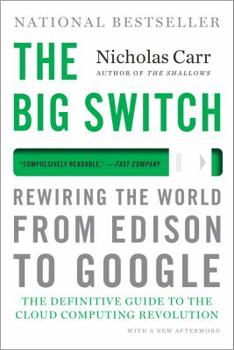The Big Switch: Rewiring the World, from Edison to Google
Select Format
Select Condition 
Book Overview
Hailed as "the most influential book so far on the cloud computing movement" (Christian Science Monitor), The Big Switch makes a simple and profound statement: Computing is turning into a utility, and the effects of this transition will ultimately change society as completely as the advent of cheap electricity did. In a new chapter for this edition that brings the story up-to-date, Nicholas Carr revisits the dramatic new world being conjured from...
Format:Paperback
Language:English
ISBN:039334522X
ISBN13:9780393345223
Release Date:June 2013
Publisher:W. W. Norton & Company
Length:304 Pages
Weight:0.55 lbs.
Dimensions:0.8" x 5.5" x 8.3"
Customer Reviews
2 ratings
From the Early Electrical Grid to Today's Computer Industry
Published by Thriftbooks.com User , 15 years ago
In the best selling book, "The Big Switch," Carr ("Does IT Matter?," "Is Google Making Us Stupid?") shows the parallels between the early development of the electrical grid system and today's transition in the computer industry. When electricity began its development, many businesses used local sources for power, including as local as a waterwheel or windmill on their own property. As the electrical grid developed, businesses were able to get power delivered, from where they didn't know or really care, as long as it came. In the computer industry, much of the same transition is going on; instead of using programs on your PC, more and more businesses are using Web 2.0 technology to host their mission critical software somewhere else, and they don't really know where, or care. No one knows where the YouTube servers are, you just have your link to the videos you need or want, and put that on your web site. The universalness of electricity drove so many revolutions in the years that followed; transportation, the middle class and a mass culture to name a few. Carr makes the argument that this switch from local computing to cloud computing will also bring seismic shifts in business, technology and culture, and that those shifts have already begun. Some of his conclusions aren't all that hopeful--a consolidation of wealth, further decline in print publishing, a reduction in the middle class, and a continuing erosion of privacy. As Carr points out, we can't begin to imagine the changes coming, it will be our children's adulthood that will really begin to see what the big switch will bring. (This is a paperback release of last year's hardcover. It includes a new list of the 20 companies that Carr feels best reflects the potential of cloud computing.)
The Dark Underside of the Internet
Published by Thriftbooks.com User , 15 years ago
In the 1990's the internet was heralded as a transformative medium that would level society and provide free information. Now after the "dot-com bust", we are seeing a different perspective. Carr describes how the internet is indeed having profound effects, and some of them may not be as benign as we anticipated: * professionalization dwindling in the wake of internet amateurs/volunteers doing the work. * "unbundling" of services and media - so that we only look at what's most attractive and ignore other things (which may be actually more important) * IT departments disappearing as everyone accesses computing services as a generic "utility" provided by an outside vendor. * our every action on the net is tracked/recorded/compiled, whether we think we are "anonymous" or not, and this info is of intense interest to industry and government. * cyberspace isn't as immune to censorship and government control as we thought. Carr's thesis is that "computing" will increasingly be done by outside vendors whom we all will access/interface with. He likens it to the growing acceptance and ubiquity of public electrification as a "utility" that replaced in-house power/lighting sources (generators, gaslight, etc.) However, I didn't completely agree with his analogy. The big difference between electricity and computing is that computing involves information, which is infinitely more valuable. If someone taps into my electrical power, my lights might brown out. But if someone taps into my data, it could be disastrous and irremediable. For this reason, I have doubts as to whether business, governments and individuals will be quite so willing to rely so heavily on an outside vendor for their computing and critical infrastructure. It's one thing if you're running a business like a photoshop utility or blog. It's quite another when you're handling sensitive financial information or public safety systems which cannot be allowed to fail or be compromised. However, the book does provide rich food for thought and so I recommend it. I just caution that in the 1990's there was a lot of hubris associated with the "power" of the internet. In this book, it seems like some of the hubris has just assumed a different form and should still be taken with a grain of salt.




